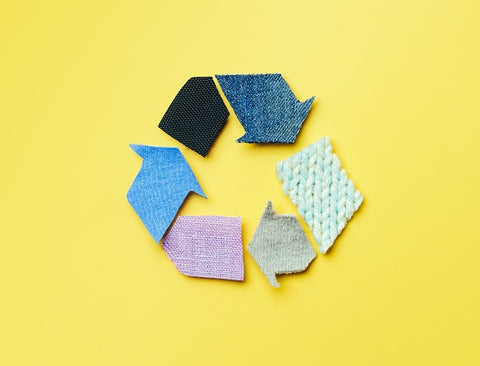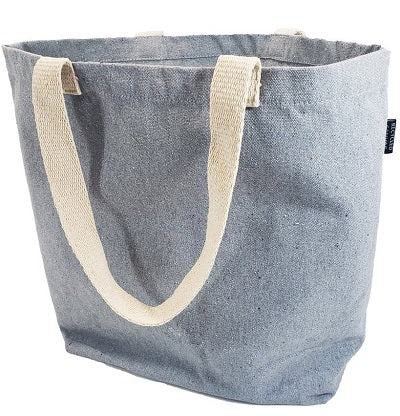
While the fast fashion industry is producing 3% of humanity’s waste and is accountable for 10% of the all the world’s carbon emissions, sustainable fashion is trying to pick up the slack. Using organic and sustainable fabrics, cutting back on the resources needed for production, and keeping waste down are just some of the points of focus of the sustainable fashion industry.
Sustainable fashion, also known as eco-fashion, is focused on having the least impact on the environment when producing both garments and accessories. This emerging trend shows a growing interest in reducing waste and keeping pollution down. One way to achieve that is by focusing on using sustainable materials and saving resources. That’s why organic, recycled, and upcycled fabrics are in when it comes to sustainable fashion.
For instance, one of the most wasteful fabrics on Earth is the good ol’ cotton. There’s almost no person on this planet that doesn’t have at least one piece of clothing or accessory made of this natural fiber in his or her wardrobe. Conventional cotton is accountable for 16% of the global pesticide use (that number may be even higher with some estimates placing it at 24%).
Cotton is also very water intensive. It takes around 710 gallons (2,700 liters) of water to grow enough cotton to manufacture a single T-shirt. Large scale cotton production also depletes the soil and has an ugly impact on ecosystems and the people producing it.
Sustainable fashion has come with at least a couple of solutions to these issues - organic cotton and recycled cotton. Organic cotton doesn’t use harmful chemicals, genetically modified seeds, or water-intensive farming techniques. Recycled cotton, on the other hand, is sourced from already existent cotton, which means that it helps keep waste down and has a minimal impact on the environment.
Organic cotton vs. Recycled Cotton: Know the Difference

Certified organic cotton is a much cleaner alternative to regular cotton as it manages to keep water, soil, and air clean by not using harmful pesticides, herbicides, fertilizers, or genetically modified crops. It also releases 46% less CO2 during production, which means that it also saves a lot of energy.
Organic cotton producers are also mindful of soil’s well-being (by practicing crop rotation), natural cycles, farmers’ well-being, and biodiversity. While organic cotton has drawn some backlash because it utilizes more water than conventional cotton, 80% of organic cotton crops are rain-fed. Plus, because the soil is in better shape after organic cotton cultivation, it is also able to retain more moisture than a depleted soil, which offsets the extra water needed for production in the long run.
These are just some of the reasons organic cotton tote bags have been a popular category at Tote Bag Factory ever since their introduction. Here are some of our top sellers:
Organic Cotton Heavy Canvas Tote Bag

Organic cotton is cultivated without synthetic fertilizers, pesticides, or harmful chemicals. Instead, it uses natural practices like crop rotation, intercropping, and beneficial insects to manage pests and maintain healthy soil. This approach aims to reduce the environmental footprint of cotton farming. By eliminating chemical use, organic cotton supports biodiversity, prevents water contamination, and helps preserve natural resources.
This sturdy organic cotton tote bag was built to last. Made of 12-ounce, 100% certified organic cotton canvas, it is also great for carrying around heavy loads. Expect this bag to be around for the long haul also due to its organic cotton web handles reinforced with stress-point stitching.
Organic Cotton Canvas Tote Bag

This tote is also made of 100% certified organic cotton, but it is less thick (6 oz vs 12 oz cotton) than the heavy canvas one, which means that it can be easily folded up and tossed in your handbag. No chemicals or toxic dyes were used in the production of this tote, which makes it perfectly safe for people prone to allergies or with sensitive skin. It also comes with a 100% Organic Cotton tag for your and your customers’ peace of mind.

Recycled cotton is salvaged cotton that would have otherwise ended up in a landfill. Most of recycled cotton is made from the scraps of cotton produced by sewing plants worldwide. This type of cotton is also known as post-industrial recycled cotton.
Used cotton garments that no one has a use for any longer may also end up as recycled cotton, aka post-consumer recycled cotton. The major drawback of recycled cotton is that it cannot be recycled ad infinitum. In the process of recycling, cotton fibers’ length, resistance, and appearance are usually negatively affected.
Recycled cotton is produced using pre-consumer or post-consumer waste, like textile mill scraps or discarded clothing. This material is collected, sorted, and reprocessed into fibers for new textiles. As a sustainable alternative to virgin cotton, recycled cotton helps minimize the environmental impact by reducing the demand for new cotton cultivation and conserving resources.
What’s more, recycled cotton needs to be mixed with other fibers, such as (recycled) polyester, for a quality end product. This is why, you won’t find pieces that are made of 100% recycled cotton with current technologies. While some companies strive toward 50% minimum content, recycled cotton is still better than newly produced fabrics if reducing waste is your main concern.
Tote Bag Factory has recently introduced a line of bags made with recycled cotton in another effort to offer our eco-conscious customers more sustainable options to choose from. Here are some of our newest green bags.
Recycled Canvas Tote Bag with Bottom Gusset

Just like all our recycled tote bags, the Recycled reusable grocery bags with Bottom Gusset comes in a timeless street style that makes it easy to accessorize and wear for years to come. This one is a sturdy tote due to its reinforced bottom gusset and reinforced recycled cotton handles. This bag is meant to be worn guilt-free at school, office, grocery store, and more as some of the greenest alternative to the incredibly wasteful plastic shopping bag.
Large Size Recycled Shopping Tote Bag

If you need a larger shopping bag made of zero-waste recycled cotton, we’ve got you covered. This oversized recycled shopping tote can fit everything you and your family needs and some more. It can perfectly double as a beach bag, travel bag, or home storage bag. The sky is the limit when looking for new uses for this roomy recycled cotton tote.
Recycled Cotton Canvas Tote Bag

If you are looking for a recycled cotton tote with a classic look, our Recycled Cotton Canvas Tote Bag is the one for you. Made of 12 oz recycled canvas and having reinforced stress points and sturdy handles, this eco-friendly bag is also made to last years of use and abuse.
Organic cotton offers the same quality and feel as conventional cotton but is grown with far less environmental impact. It comes from non-GMO seeds and is cultivated without synthetic pesticides, insecticides, or chemical fertilizers. Instead, farmers use eco-friendly and ethical practices like crop rotation and no-till farming, which help maintain healthy soil and support sustainable agriculture.
Reusable shopping bags need to be used at least 171 times to be truly superior to plastic, and this bag is the perfect candidate for the job. Plus, since it is made with recycled materials, that daunting number of re-uses may be even lower.
Conclusion
When comparing recycled cotton and organic cotton, there’s no definitive winner. The real question is how we can improve the sustainability of both. Organic cotton farming still requires greater efficiency, while recycled cotton needs advancements in quality and scalability.
Still, both are far more eco-friendly than conventional cotton. For consumers, the priority should be reducing personal carbon footprints. Recycling cotton is far better than discarding it, and choosing organic cotton is a significantly greener option than its traditional counterpart. You can check our website Tote Bag Factory and find the best deals for reusable shopping bags.
FAQs
What is the difference between organic cotton and recycled cotton?
Organic cotton is grown without chemicals, while recycled cotton is made from waste materials like old clothes or fabric scraps.
Is organic cotton more eco-friendly than recycled cotton?
Recycled cotton is often more eco-friendly as it reduces waste, whereas organic cotton eliminates harmful chemicals but still requires resources.
How sustainable is organic cotton?
Organic cotton is sustainable as it avoids harmful chemicals, conserves water, and supports healthier soil, though it still uses land and water.
What are the benefits of using recycled cotton in fashion?
Recycled cotton reduces waste, conserves resources, and lowers the need for new cotton production, making it more sustainable for fashion.
Can tote bags be made from 100% recycled cotton?
Yes, tote bags can be made entirely from recycled cotton, offering an eco-friendly option for sustainable fashion and everyday use.
Does organic cotton use a lot of water?
Organic cotton uses less water than conventional cotton but still requires significant amounts, making efficient water management crucial for sustainability.
You can have a look at our full offer of recycled cotton bags here.

